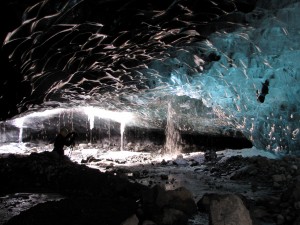
Eastern Iceland: Inside an cave under a glacier, a photographer captures the melting ice. Photo by Andrea Willingham
Where does our knowledge come from about glaciers and the natural resources closely tied to the ice? Who gets to decide how we manage, manipulate, control, discuss, and destroy the world’s glaciers (and who is left out)? How does this knowledge affect power relations among people? Glaciers have long affected human societies — not only the inhabitants living close by glaciers, but also anyone living along their waterways and, increasingly, those far away who will be affected by sea level rise. Scientific studies have brought us a long way in our understanding of glaciology, but much can be learned from the collective memory, oral histories, and traditional knowledge of people who have been directly affected by glaciers and the natural resources that surround them, for generations.
Glaciers have been important historically because of their direct impacts on water supplies, wildlife, recreation, and mountain climbing. They have shaped the tourism economies that have sprung up around the world’s glaciated mountains. Whether in Switzerland or Peru, Alaska or Nepal, Norway or Chile, glaciers have inspired everything from curiosity, to spirituality, stories, and lifestyles. All of these affect not only knowledge and experiences, but also power relations and control over mountains and water.
Researching and understanding the experiences and knowledge of the people who have lived in glacial environments for generations, and who rely directly on the natural resources that surround them, helps expand our current academic understanding of glaciers, which can provide key context –and hopefully decolonize — climate change adaptation plans and environmental management practices. By triangulating scientific knowledge, traditional and local knowledge, and history, we can begin to form a clearer picture of what glaciers truly mean for humankind.